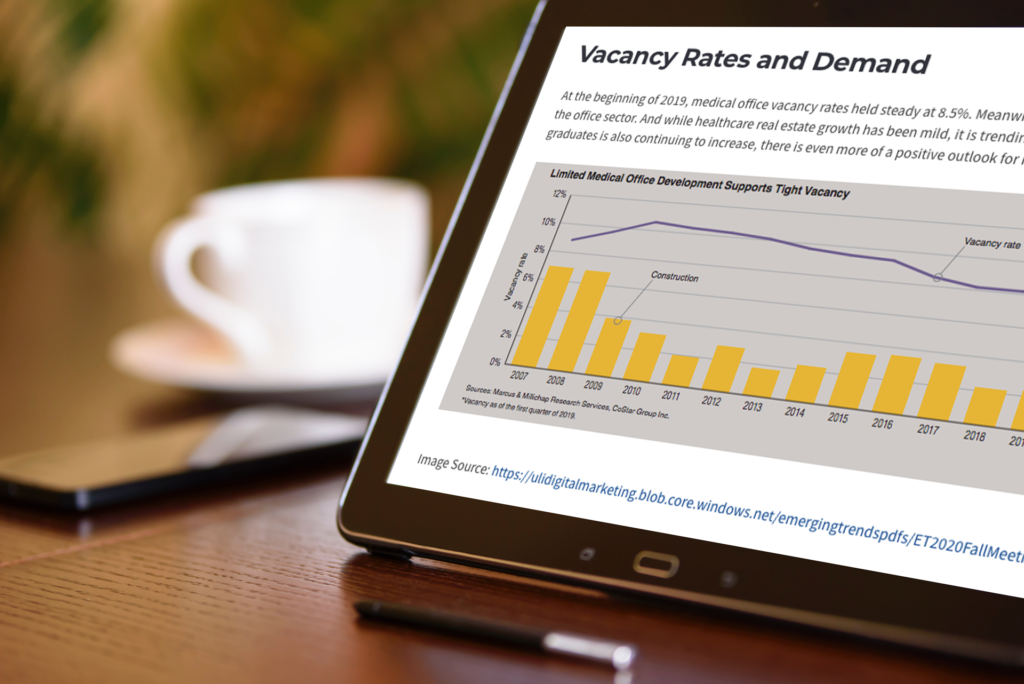Manufacturing sites that were once mass-producing iPhones and Nissan vehicles are making face masks for healthcare workers instead. Major conference centers have cleared their schedules, making way for gurneys rather than vendor displays. COVID-19 has changed much about how the nation and the world are functioning. Like many industries, commercial real estate is facing some new challenges caused by COVID-19.
REITs and COVID-19
COVID-19 has resulted in a massive economic downturn. Bisnow explains that between February and March 16th, real estate investment trusts fell by 34%. That drop implies a real estate asset value decrease of 24%. In addition to this glimpse into the CRE market, there are a few more specific numbers that indicate the position of the medical real estate.
While the immediate future of the medical office building (MOB) sector is not clear, there is at least one analysis that is offering guidance. Revista recently reported information specific to MOB REITs. They reviewed implied cap rates from December 31, 2019 to March 31, 2020, analyzing these three MOB REITs: Healthcare Trust of America (NYSE: HTA), Physicians Realty Trust (NYSE: DOC), and Healthcare Realty Trust (NYSE: HR). At the end of 2019, their collective enterprise value was $21 billion, with an implied cap rate of 5.1%. But at the close of the first quarter of 2020, they had dropped to a total of $17.8 billion with an implied cap rate of 6.2%. According to Revista, public markets indicate an increase of about 100 basis points between the fourth quarter of 2019 and the end of the first quarter of 2020.
These are important numbers for investors to monitor. There is hope that the economy will bounce back once the virus has subsided. But while the nation braces for the peak of the virus, the commercial real estate industry is adjusting in a few other unique ways.
Hospitals Are Restructuring
Many hospitals are having to restructure their spaces to accommodate an influx of COVID-19 patients. Surgery step-down units are turning into intensive care units, and hospitals are reviewing facility needs. Transitioning a space from one medical use to another takes strategic planning and plenty of additional expenses.
And in addition to converting spaces within a large hospital, some medical groups are moving patients to new locations. As non-emergency procedures have halted, empty medical buildings have become available for patients who do not have COVID-19. Moving these patients to other facilities provides more space for better-equipped hospitals to treat patients with the novel coronavirus. Healthcare professionals are working hard to creatively restructure their facilities to serve patients in every way possible.
Manufacturing Sites Adapted to Support Healthcare
Manufacturing plants that would otherwise remain vacant due to personnel scale-backs are now supplying healthcare workers with much-needed PPE. In one case, Ford and General Electric Healthcare are planning to make 50,000 ventilators within 100 days. Another prime example is Hanes, which plans to produce 1.5 million masks per week.
Many times, when companies refit their existing facilities, they lean toward producing items that are related to their capabilities. For example, when Shanghai General Motors began producing face masks, they already had a fabric supplier (usually for car interiors) that produced medical-grade textiles. GM also had the physical space requirements for creating the masks. Thanks to generous businesses like these, industrial spaces can be adapted to manufacture and distribute medical supplies at a faster rate.
While some of these commercial real estate adjustments are temporary, their impacts are long-lasting. Many CRE owners have learned how to transform their spaces for new products, temporarily donate space to the medical field, or how to convert sections of their MOB for a massive influx of patients. In just a few short months, the nation will begin to see the depth of the impact of COVID-19 on the CRE market and national economy. And perhaps one of the longer-lasting effects of COVID-19 will be a renewed sense of the importance of medical real estate.
If you are interested in learning more about investing in commercial real estate, or if you have questions about buying, selling, or leasing a commercial property, please contact an HBRE advisor. Our team of experienced CRE professionals have the skills and insight to assist with all property transactions. To reach out to us directly, email [email protected] or call 615-564-4133.




